When it comes to outdoor entertainment, the options available can be overwhelming. Whether you’re looking to set up an outdoor movie night in your backyard or turn your patio into a home theater experience, there are now two popular choices: outdoor TVs and projectors. But which one is better? To help you decide between the two, this article will take a look at their pros and cons so you can make an informed decision about which option best suits your unique needs. Keep reading to learn more about how each type of display technology works and what advantages they offer for creating the perfect outdoor viewing environment!
What Makes an Outdoor TV?
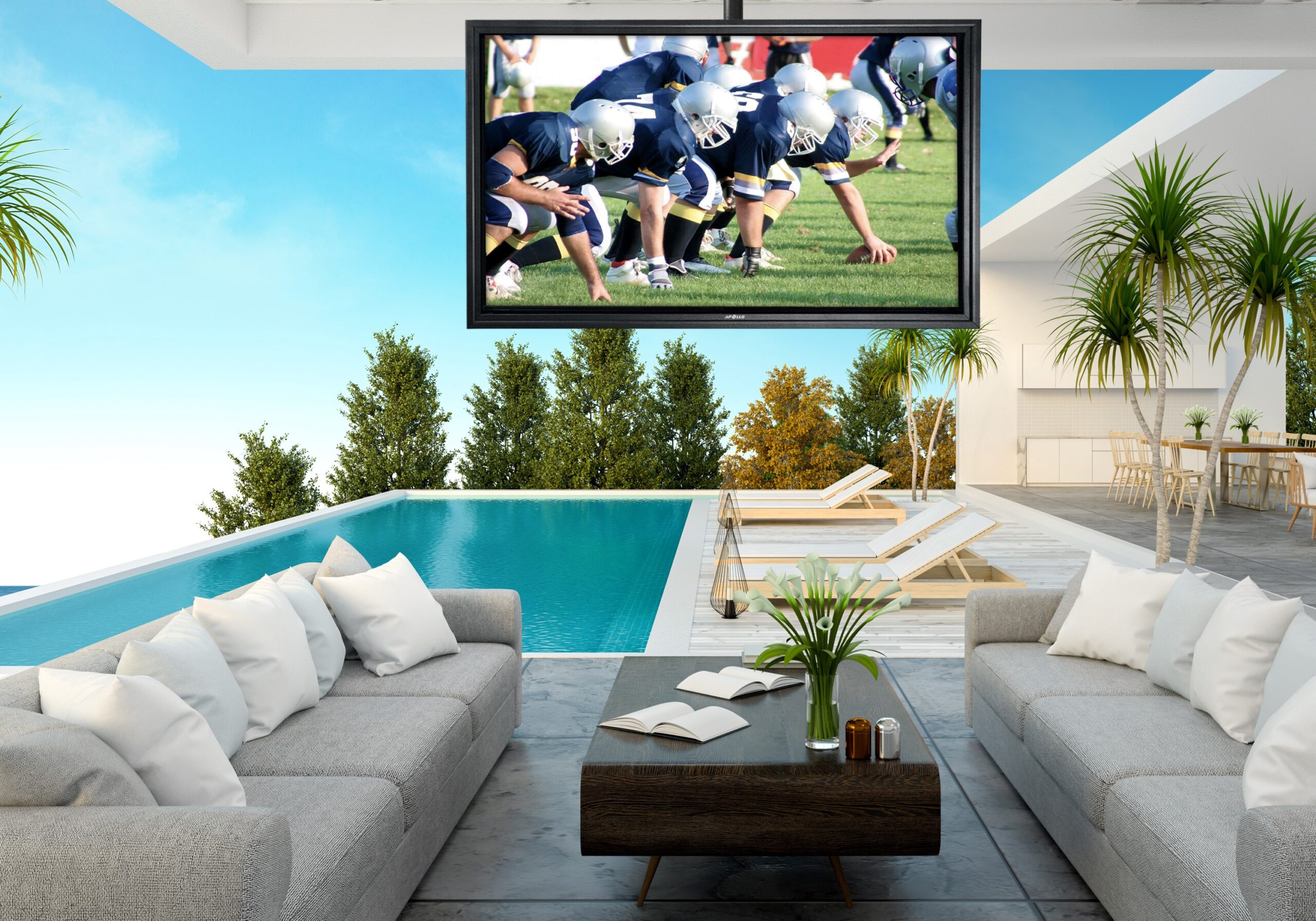
Outdoor television is designed to be used outside, even in harsh conditions. Unlike regular televisions, outdoor TVs are built with durability and longevity in mind. In general, they have a higher water-resistance rating and an IP rating that will protect them from dust, dirt, and moisture.
Additionally, many models are also made with anti-glare technology for visibility in bright sunlight or LED backlighting for improved contrast levels when watching in the dark.
Furthermore, most outdoor TVs come equipped with features like wireless audio streaming capabilities and USB ports for connecting external devices such as gaming consoles.
They may also include integrated speakers so you can enjoy your favorite movies or shows without needing additional speakers. With all these features combined, an outdoor TV provides a great option for entertainment regardless of where you are.
Whether it’s a pool party, barbecue, or camping trip, an outdoor TV is the perfect way to enjoy your favorite shows and movies while spending time with friends and family [2].
How do Projectors Work?
Projectors use a light source, usually an LED or laser, to project an image onto a screen. The image is formed by passing the light through a lens and reflecting it off of mirrors, lenses, and prisms so that it can be directed at the screen. Depending on the type of projector being used, the image will either be transmitted digitally (using either a digital processor chip or microchip) or optically (using an incandescent bulb). In both cases, the projector uses a light source to focus its beam and produce the desired effect onscreen.
Projectors also come with different settings for different types of displays. This includes brightness, contrast levels, color accuracy, aspect ratios, and more. For example, professional video projectors can display high-resolution images, while business and home theater projectors can be adjusted for better visibility in darker or brighter environments. The projector will also have different settings for the size of the image being projected so that it scales correctly with the size of the viewing area.
Finally, most modern projectors come with built-in speakers so that sound can be heard along with the visuals. This allows viewers to experience audio and visual effects simultaneously. Projectors can also include features such as HDMI ports and wireless streaming capabilities that make them more versatile than ever before.
Advantages and Disadvantages of Outdoor TVs
Outdoor TVs have been gaining popularity in recent years as homeowners look for ways to enhance their outdoor spaces. Outdoor TVs offer several advantages, including the ability to watch sports and movies outdoors without worrying about weather conditions spoiling your viewing pleasure.
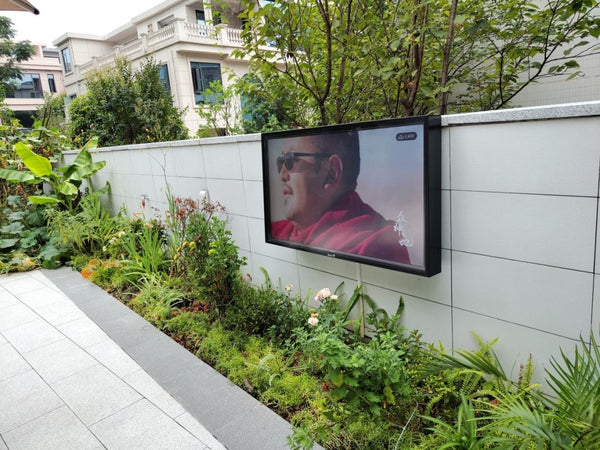
Additionally, many models are designed with specific features that make them resistant to humidity, dust, and harsh temperatures, making them suitable for almost any location.
However, there are some downsides associated with having an outdoor TV. One of the biggest drawbacks is cost – outdoor TVs tend to be more expensive than traditional indoor televisions due to factors such as waterproofing technology and specialized mounting systems.
Additionally, because these types of televisions are exposed to the elements on a regular basis, they may require more frequent maintenance than standard indoor TVs. Finally, it’s important to consider the safety of your outdoor TV and take any necessary precautions, such as keeping it in a safe and secure location when not in use.
Overall, outdoor TVs offer homeowners an opportunity to enjoy their favorite shows and movies outdoors without worrying about unfavorable weather conditions. Though there are some drawbacks associated with these types of televisions, many people find them worth the investment due to their durability and convenience.
Ultimately, deciding whether or not an outdoor TV is right for you will depend on your budget, needs, and lifestyle.
Advantages and Disadvantages of Outdoor Projectors
Outdoor projectors offer many advantages, such as portability, ease of installation, and convenience. They can be used to create large-scale images with bright colors and clear visuals on any surface – even in direct sunlight! However, some potential drawbacks need to be taken into consideration before investing in an outdoor projector.
Advantages:
Easy Installation: Outdoor projectors are relatively simple to install as they don’t require complicated wiring or additional equipment. All they need is a power source and the right accessories like mounting brackets and cables. This makes it easy for anyone to set up their own outdoor projection system.
Portability: Portable outdoor projectors allow you to take your show on the road. You can easily transport them to events and parties or set up temporary projection systems in any location, indoors or outdoors.
Bright Colors & Clear Visuals: Outdoor projectors are designed to create bright, vivid images even in direct sunlight. This makes them ideal for outdoor movie screenings, lectures, presentations, and more.
Disadvantages:
Expense: Outdoor projectors can be expensive as they require additional accessories and hardware for installation. As such, it may not be worth the investment if you don’t plan on using it frequently.
Heat Issues: The intense outdoor heat can cause damage and
overheating of both the projector and its components. It is important to keep your projector cool with a cooling system or air conditioning in order to protect it from heat-related issues.
Power Source Dependence: Outdoor projectors require access to an electricity source, which may not be available in some remote locations. Additionally, they may need additional specialized equipment like generators depending on the situation. This can add extra costs and hassle to the setup process.
Overall, outdoor projectors offer a great way to display images and videos outdoors with bright colors and clear visuals. However, certain factors must be taken into consideration when investing in one – namely cost, installation requirements, power sources, and heat-related issues [2].
Outdoor TV vs. outdoor projector: which should you choose?
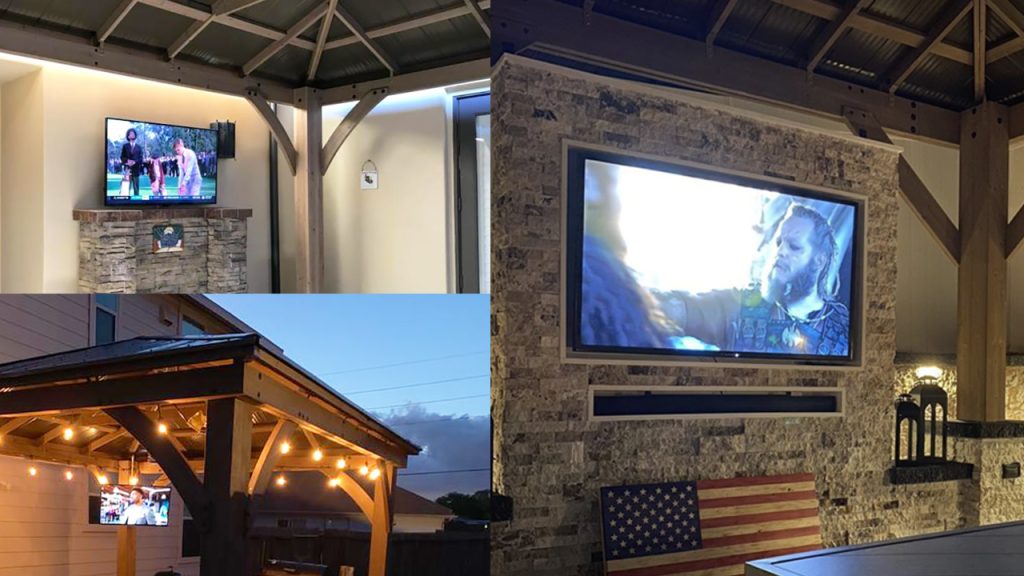
Screen sizes
When it comes to choosing between an outdoor TV and an outdoor projector, one of the main considerations is probably going to be screen size. Most outdoor TVs are limited to around 50 inches, which may not be enough for a large gathering or even just to watch sports with friends. On the other hand, an outdoor projector can project a much larger image onto any surface you desire and give your backyard movie nights more impact.
Costs
Another important factor in this decision is cost. Outdoor TVs tend to be on the pricier side, especially if you’re looking for something with a higher resolution or bigger display size than usual. However, buying an outdoor projector and creating your projection setup can save you some money as long as you’re willing to commit to the setup.
Maintenance
When it comes to maintenance, outdoor TVs are probably the simpler choice. They’re designed for long-term outdoor use and will mostly just require occasional cleaning or dusting. On the other hand, an outdoor projector may require a bit more maintenance, such as occasionally replacing bulbs and making sure that all connections are firmly secured.
Lighting
Lighting is another important factor when it comes to choosing between an outdoor TV and an outdoor projector. Outdoor TVs usually have special screens that are designed to reduce or eliminate the effects of ambient light, while projectors require a dark space to properly display the image. If you’re looking for a way to watch TV in your backyard during the day, then an outdoor TV may be the better choice.
Weatherproofing
Finally, one of the most important considerations when it comes to choosing an outdoor viewing system is weatherproofing. Outdoor TVs are designed to withstand the elements and can handle rain, snow, and other harsh conditions with ease. On the other hand, projectors require additional protection from the rain or sun to function properly [3].
How Do Curved Projector Screens Compare to Flat Screens?
Curved projector screens allow for a more immersive viewing experience than flat screens, as the shape of the screen itself helps create a wider field of view. This means that the edges of the image appear further away and are more in line with peripheral vision, creating an all-encompassing visual effect. Curved projector screens also help reduce distortion caused by angle issues, resulting in a much clearer picture.

The biggest downside to curved projection screens is their price. They are generally much more expensive than standard flat screens, so they may not be cost-effective solutions if you’re on a tight budget.
However, if you want to get the most out of your viewing experience, a curved projector screen can provide an unbeatable level of immersion and clarity.
Overall, curved projector screens are a great option for those looking to create an immersive viewing experience in their home theater. They provide a wider field of view, reduce distortion, and give viewers a more realistic sense of the action on screen. However, they come with a higher price tag than flat screens, so it’s important to consider your budget when making your decision.
Ultimately, though, if you’re looking for the best possible picture quality and an unbeatable level of immersion, curved projection screens are worth the investment [4].
How to install a TV and Projector Outdoors?
Outdoor TV and projector installations are becoming increasingly popular for outdoor entertainment. Whether it’s for a backyard movie night or for watching the big game, having a TV and projector outdoors is a great way to enjoy the outdoors while still keeping up with your favorite shows and movies. Installing an outdoor setup requires careful planning, so here are some tips on how to properly install a TV and projector outdoors.
First, you’ll need to find the right spot. The ideal location should provide enough space to fit both the TV and projector, while also offering protection from the elements such as rain, wind, snow, etc. There must be no direct sun hitting either device as this could damage them over time. If possible, you should also look for a spot that has access to an electrical outlet or power source.
Once you have the perfect location for your outdoor TV and projector setup, you’ll need to secure them properly. For the TV, make sure it’s mounted securely on a wall mount or stand with appropriate hardware. This will help protect against theft as well as weather damage. As for the projector, it can be placed on a secure projector mount either on the ground or wall-mounted. If mounting outdoors, use stainless steel hardware to guard against rusting and corrosion over time.
Finally, you’ll need to connect all cables and wires necessary for both devices. Make sure that all cords are protected from moisture and that they’re securely connected to outlets. You should also ensure that all wires are properly labeled and organized so you can easily find the right one if needed.
By following these steps, you’ll be able to install a TV and projector outdoors with ease. With careful planning and proper installation methods, you’ll be able to enjoy outdoor entertainment for years to come!
Outdoor Projector, Outdoor TV, or Outdoor TV Cover?
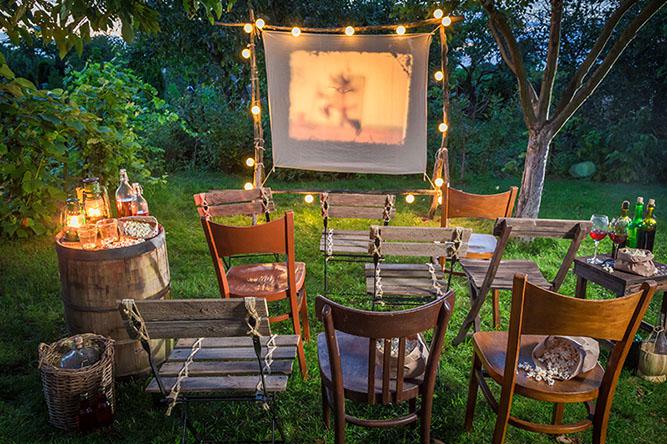
When it comes to enjoying your outdoor space, there are three main options: an outdoor projector, an outdoor TV, or an outdoor TV cover. Each of these options has its own unique pros and cons – so let’s take a closer look at each one to help you decide which is best for you!
Outdoor Projector:
An outdoor projector is a great choice if you want to watch movies outside without having to worry about the elements. It uses high-quality image projection technology to give you a movie theater-like experience in your backyard. Plus, since projectors don’t require direct sunlight like TVs do, they can be used even when the sun goes down. The downside is that projectors tend to be more expensive than TVs, and may require additional equipment for installation.
Outdoor TV:
An outdoor TV is a great option if you want to take your entertainment experience to the next level. Outdoor TVs are built with special weatherproofing technology that makes them resistant to rain, wind, and other elements so you can enjoy movies or sports games without worrying about the weather ruining your fun. The downside is that they tend to be more expensive than projectors and must be used in direct sunlight for optimal performance.
Outdoor TV Cover:
If you’re looking for an affordable way to protect your existing TV from the elements, an outdoor TV cover might be a good choice.
These covers come in various sizes and materials so you can find one that fits your TV perfectly and provides the right level of protection. The downside is that they don’t provide the same picture quality as a projector or outdoor TV, but they do offer basic protection from dirt, dust, and rain.
No matter which option you choose, you’ll be able to enjoy outdoor entertainment like never before! Just remember to consider all three options when deciding which is best for you.
FAQ
Is a projector better than a TV for outside?
The answer to this question depends on what you’re looking for in a display. Projectors generally have larger maximum sizes, but they also require more space and additional setup. TVs tend to be easier to set up, have lower input lag for gaming, and are better suited for watching sports or other fast-paced programming.
Additionally, some projectors may not perform well in direct sunlight or windy environments which can affect the projected image quality. Ultimately, it will depend on your needs and preferences when deciding which type of display is best for outside use. However, both televisions and projectors can make excellent outdoor displays!
Can you use a projector as a TV outside?
Yes, you can use a projector as a TV outside. However, you may need to purchase additional equipment such as a screen or special outdoor enclosure to protect the projector from dust and debris.
Additionally, some projectors may not perform well in direct sunlight or windy environments which can affect the projected image quality. For these reasons, it is important to research your projector’s capabilities before purchasing it for outside use. With the proper setup and protection, using your projector as an outdoor television can be a great option.
What type of maintenance do I need to do for my outdoor TV/projector?
It is important to regularly inspect and clean your outdoor display to maintain its performance and lifespan. Depending on where you are using it, you may need to clean the exterior of your display from dust and debris that can accumulate over time.
Additionally, if you are using a projector outdoors, you should periodically change the filter to keep the interior fan and lens free of dirt, dust, and other particles.
Finally, if your outdoor display is exposed to direct sunlight or windy environments, make sure to check on its position regularly to ensure it is not being affected by these elements.
Are there any special considerations for installing an outdoor TV/projector?
Yes. Depending on where you plan to install your outdoor display, you may need to purchase additional equipment such as a waterproof enclosure or special mounting hardware. Additionally, environmental factors such as direct sunlight or windy environments can affect the performance of your display and may require extra setup for optimal operation.
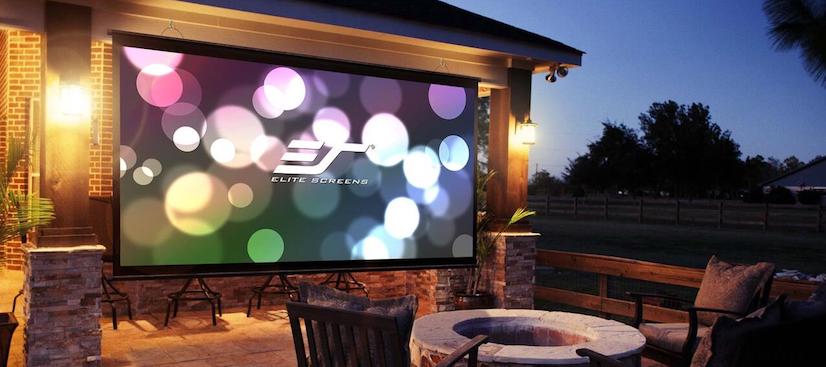
Can I use regular speakers with an outdoor TV/projector?
Yes, you can use regular speakers with an outdoor television or projector. However, if you plan on using speakers outdoors, it is important to choose waterproof and dustproof models that are designed specifically for outside use. Additionally, you should consider buying amplified speakers that will be loud enough to hear over ambient noise levels in your area.
Why don’t people use a projector instead of a TV?
There are several reasons why people may choose to use a television instead of a projector. Projectors require additional setups such as mounting and focusing, and they typically have lower maximum sizes than most televisions. Additionally, some projectors may not perform well in direct sunlight or windy environments which can affect the projected image quality.
Televisions tend to be easier to set up, have lower input lag for gaming, and are better suited for watching sports or other fast-paced programming.
Are outdoor TVs/projectors energy efficient?
Yes, many modern outdoor TVs/projectors are designed with energy efficiency in mind. Many models feature low-power LED backlight systems, which help to reduce power consumption.
Additionally, some models are designed with automatic brightness and power-saving features for further energy savings. It is important to research your model’s energy efficiency ratings before purchasing it to ensure you are getting the most efficient display possible.
Useful Video: Outdoor TV vs regular Tv outside. Sun rite Tv review.
Conclusion Paragraph
Outdoor TV or Projector? Which is better? It depends entirely on your individual preferences and circumstances. If you’re looking for convenience or want to keep costs low, an outdoor TV may be the best choice for you. On the other hand, if you want superior picture quality, a projector is likely your best bet. Ultimately, only you can decide which type of outdoor display is most suitable for your needs. Whichever option you choose, it’s sure to provide countless hours of entertainment in the great outdoors!
References
- https://www.nytimes.com/wirecutter/blog/outdoor-tvs/
- https://thehometheaterdiy.com/outdoor-tvs-vs-projectors/
- https://www.techradar.com/news/outdoor-tv-vs-outdoor-projector-which-should-you-choose
- https://www.wemax.com/blogs/tutorials/curved-projector-screens-vs-flat-screens-which-is-right-for-you

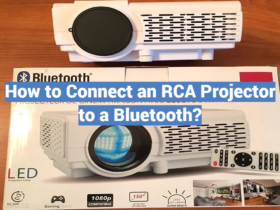
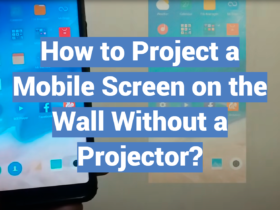

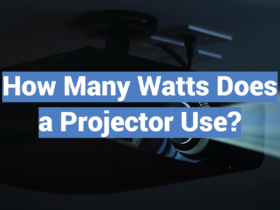
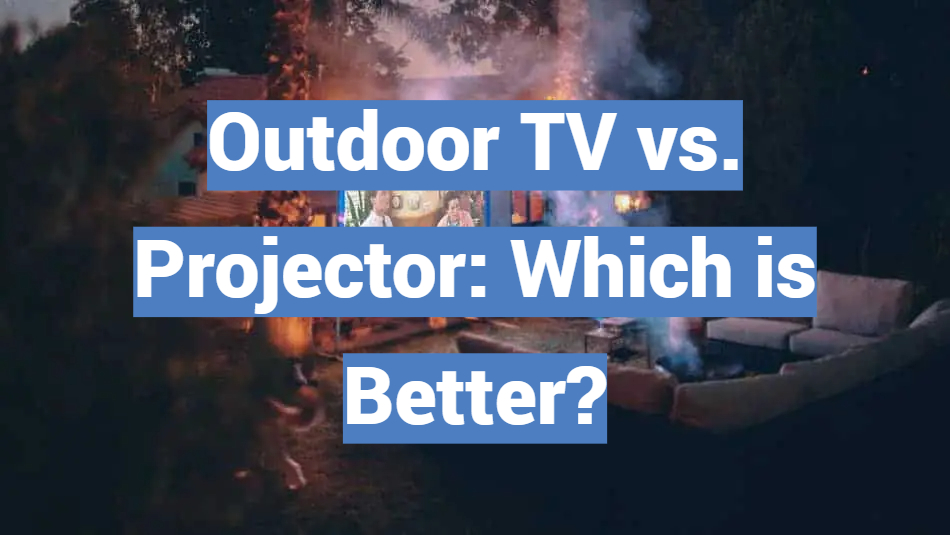
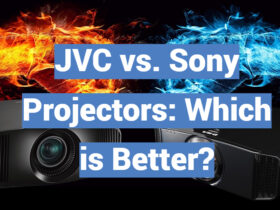
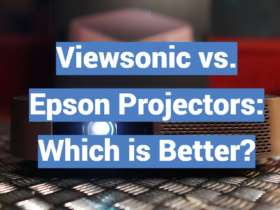
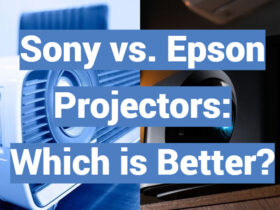
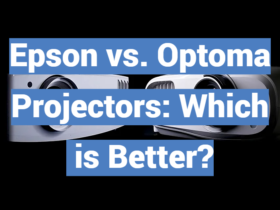
Leave a Review